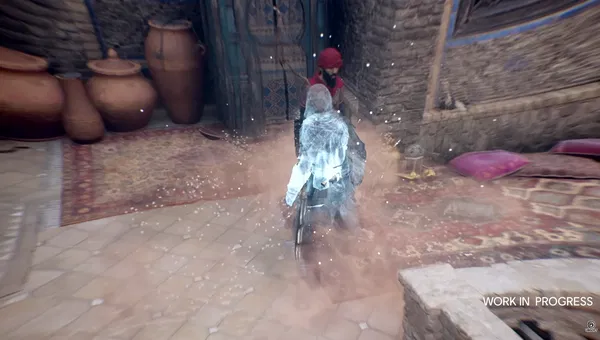

Assassin’s Creed Mirage is just days away from release and fans are starting to wonder if their PC will support it. As Mirage is a AAA title, fans can expect the game to not run on older PCs. Although the new game is around 40Gb in size, players with a decent gaming PC will be able to run it without much problem. But how do you define decent in this context?
Ubisoft has announced the system requirements for Assassin’s Creed Mirage. And by the way things seem, the game looks very playable on systems that are even 6 years old. While the game supports uncapped FPS even at 4k resolutions, fans wonder if their systems can run the game. To clear out the confusion, we have listed the system requirements for AC Mirage from running the game at 1080p at 30FPS up to 4k at 60FPS.
ADVERTISEMENT
Article continues below this ad
1080p System requirements for Assassin’s Creed Mirage
Players can enjoy AC Mirage at 1080p resolutions while running an Nvidia 10 series GPU on it. While it is suggested to have a stronger GPU, the minimum requirement starts at the NVIDIA GeForce GTX 1060 6 GB.

Minimum requirements (1080p at 30 frames per second)
- Operating system Windows 10, Windows 11 (64-bit versions)
- Processor AMD Ryzen 5 1600 @ 3.2 GHz, Intel Core i7-4790K @ 4.4 GHz (Intel Core i5-8400 @ 4.0 GHz for Intel Arc with ReBAR), or better
- RAM 8 GB (running dual-channel mode)
- Video card AMD Radeon RX 570 (4 GB), Intel Arc A380 (6 GB), NVIDIA GeForce GTX 1060 (6 GB), or better
- Hard drive 40 GB available storage (SSD recommended)
- DirectX version DirectX 12
Recommended requirements (1080p at 60 frames per second)
- Operating system Windows 10, Windows 11 (64-bit versions)
- Processor AMD Ryzen 5 3600 @ 4.2 GHz, Intel Core i7-8700K @ 4.6 GHz, or better
- RAM 16 GB (running dual-channel mode)
- Video card AMD Radeon RX 5600 XT (6 GB), Intel Arc A750 (8 GB), NVIDIA GeForce GTX 1660 Ti (6 GB), or better
- Hard drive 40 GB available storage (SSD recommended)
- DirectX version DirectX 12
Recommended configurations for higher resolutions in AC Mirage
Recommended 2K configuration (1440p, 60 frames per second)
- Operating system Windows 10 (64-bit version), Windows 11 (64-bit version)
- Processor AMD Ryzen 7 3700X @ 3.6 GHz, Intel Core i7-9700K @ 3.6 GHz, or better
- RAM 16 GB (running dual-channel mode)
- Video card AMD Radeon RX 5700 XT (8 GB), NVIDIA GeForce RTX 2070 (8 GB), or better
- SSD Storage 40 GB available storage
- DirectX DirectX 12
ADVERTISEMENT
Article continues below this ad
Read More – What Is the Assassin’s Creed Story So Far? Here Is a Simplified Timeline of the Franchise’s Story
Recommended 4K configuration (2160p, 60 frames per second)
- Operating system Windows 10 (64-bit version), Windows 11 (64-bit version)
- Processor AMD Ryzen 5 5600X @ 3.7 GHz, Intel Core i5-11600K @ 3.9 GHz, or better
- RAM 16 GB (running dual-channel mode)
- Video card AMD Radeon RX 6900 XT (16 GB), NVIDIA GeForce RTX 3080 (10 GB), or better
- SSD storage 40 GB available storage
- DirectX DirectX 12
ADVERTISEMENT
Article continues below this ad
These system requirements provide a comprehensive breakdown of the hardware needed to enjoy Assassin’s Creed Mirage at various resolutions and frame rates. Whether you’re planning to explore the 9th century Baghdad at 1080p or dive into the breathtaking 4K experience, Ubisoft has ensured that a wide range of gaming PCs can embark on this exciting journey.
Watch This Story: Assassin’s Creed Mirage Drops a Stunning Show at PlayStation Showcase 2023
ADVERTISEMENT
ADVERTISEMENT
ADVERTISEMENT
ADVERTISEMENT

